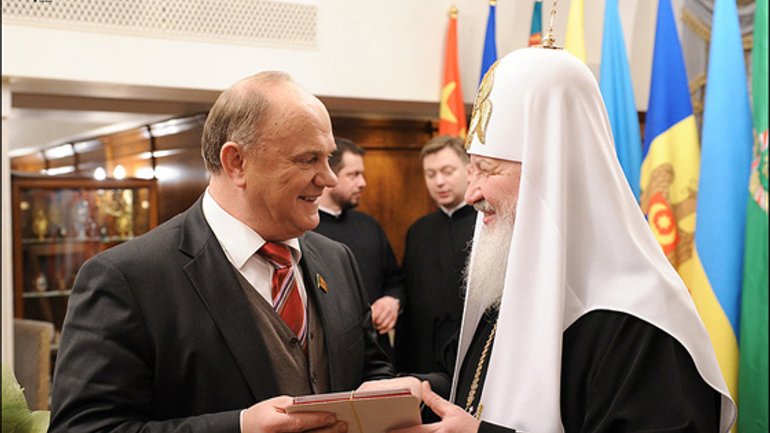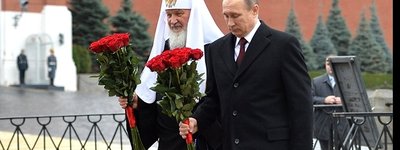From Crypto-Christians to Pseudo-Orthodox?

…resentment of alleged Western Christian hostility and feelings of victimization are a common motif in Russian Orthodox thinking.
Interfax news agency reported on 27 March that the Gennadii Ziuganov, head of Russia’s Communist Party, sees the germ of Russophobia in Western Europe’s attitude towards Russian Orthodoxy. “Listen carefully,” he is quoted as saying in his report at the 13th joint plenary session of the Communist Party's Central Committee and Central Control Commission, “hatred of Russia has existed in Europe for centuries, its ideological origins are to be found in the split of Christianity into the Catholic and the Orthodox churches." He cited the Crusaders’ Constantinople massacre of 1204, the expansionism of Catholic Poland in the 16th and 17th centuries and, curiously enough, the bad press accorded to Tsar Ivan Vasil’ievich, known in the West as “the Terrible.”

Comrade Ziuganov’s historiosophy is the direct opposite of what historian Arnold Toynbee believed: to him, it was the Russians who had always been hostile to the West. In his view, they had adopted the traditional Byzantine attitude, which consisted of what he called “orthodoxy” – the attitude that “Byzantium is always right and the West is always wrong” -- and a sense of destiny as the heirs of classical and Judaeo-Christian civilization. Toynbee found this to be as characteristic of the USSR as of imperial Russia (Arnold J. Toynbee, Civilization on Trial, New York, 1948, pp. 171-72).
Commenting on Ziuganov’s words, analyst Robert Moynihan recalls his brief encounter with him in November 2008 (Letter #12, 27 March 2017). On that occasion, comrade Ziuganov told him that in the Soviet era, people who formally became Communist Party members had nevertheless remained, in essence, Orthodox Christians.
This assertion would be difficult to verify, as one cannot easily discover the secret thoughts of Communists. In recent years, however, Russia’s dwindling Communist Party has shown a new appreciation of religion. Last December Al Jazeera reported that Ziuganov, who had written a Party document on religion in 2012, regarded Jesus as “the first Communist,” and saw common values between Communism and the major world religions. (“Russia's Communist Party turns to the Orthodox Church,” Al Jazeera, 12 December 2016). This would not be the first attempt to reconcile Communism (or at least Marxism) with Christianity: one is reminded of Latin American liberation theology and, on the individual level, such thinkers as the British novelist Graham Greene, who managed to be both Catholic and Communist.
But there is a crucial difference between a Communist who is really Orthodox, and one who is also Orthodox. The former feigns Communism but truly believes in Christianity; the latter finds it possible to believe in both. One can accept comrade Ziuganov’s claim that many Communist Party members were crypto-Christians. But one wonders how many committed Communists today are capable of the mental gymnastics required to combine faith in Marxism with faith in Jesus Christ.
The Russian Communist Party’s turn to religion blends easily with its narrative of Western maltreatment. It coincides, however, with the publication of troubling statistics about the state of Orthodox Christianity in the country. Post-Soviet surveys indicate that the Russian religious revival that followed the demise of the USSR in 1991 has, in recent years, levelled off. Religion analyst Nikolai Mitrokhin cites surveys reporting that today, as many as 85% of Russians claim to be Orthodox Christians (though some surveys yield a figure as low as 68 %). Yet according to the Levada Center, 30% of them state that they do not believe in the existence of God. According to the Center’s survey, 60% of Orthodox do not consider themselves “believers,” while only 40% are certain that God exists. This is corroborated by findings that religious observance in Russia is very low. In 2008, Patriarch Kirill stated that only 10% of Russians were “churched.” The proportion of Russians who regularly attend church has been reported to be only between 0.5% and 2%. Up to 8% attend about once a month. Others visit churches on a fragmentary and irregular basis. It has been reported that according to the Ministry of Internal Affairs, even the Easter services attract only about 5% of the country’s population. Various statistics on other forms of church participation, such as confession, yield similar conclusions. It appears, then, that for the overwhelming majority of Russians, Orthodoxy is a kind of cultural affiliation or marker of identity, but neither a commitment to faith nor a regular religious practice – both of which are marks of the Orthodox Christian.
Comrade Ziuganov’s remarks on Western Russophobia sound familiar: resentment of alleged Western Christian hostility, and feelings of victimization, are a common motif in Russian Orthodox thinking. These views harmonize with Vladimir Putin’s challenge to Euro-Atlantic hegemony. But while the Communist leader’s appreciation of Russian religiosity is admirable, its depth and breadth are altogether different matters. Russians are not alone, it is true, in the evident superficiality of their faith. But one would think that the rational response to this state of affairs would be not to merely berate the West and boast about Holy Russia, but to get to work re-evangelizing the Russian people.










